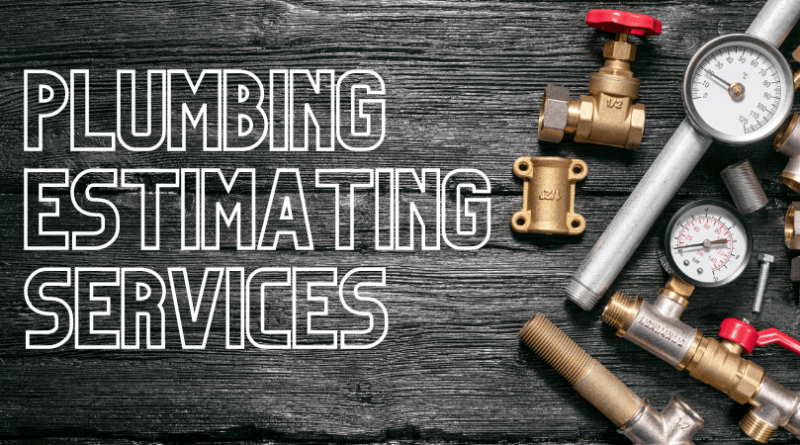The Role of Plumbing Estimating Services in Successful Project Bidding
In the construction industry, accurate estimating plays a crucial role in securing profitable projects. Among various trades, plumbing estimating services ensure that contractors submit competitive yet feasible bids. These services help businesses determine material costs, labor requirements, and project timelines, enabling them to win bids and execute projects efficiently. This article explores the significance of plumbing estimating services in successful project bidding, outlining their benefits, challenges, and best practices.
Understanding Plumbing Estimating Services
Plumbing estimating services involve the calculation of all costs associated with a plumbing project. This includes material pricing, labor wages, permit fees, and overhead costs. The primary goal is to provide a detailed and accurate estimate to help contractors prepare competitive bids.
These services are often offered by professional estimators who use advanced software tools and industry knowledge to generate precise cost projections. Whether for residential, commercial, or industrial projects, plumbing estimators ensure that every component is accounted for, minimizing financial risks and unexpected expenses.
Importance of Plumbing Estimating Services in Project Bidding
1. Accuracy in Cost Estimation
One of the main advantages of professional plumbing estimating services is cost accuracy. A precise estimate helps contractors avoid underbidding or overbidding. Underbidding can lead to financial losses, while overbidding can reduce the chances of winning the contract. By using professional estimators, contractors can achieve the right balance in their bid.
2. Time-Saving and Efficiency
Manually estimating project costs can be time-consuming and prone to errors. Plumbing estimating services streamline this process, using sophisticated software and databases to provide quick and accurate estimates. This efficiency allows contractors to focus on other aspects of project planning and management.
3. Competitive Bidding
The construction industry is highly competitive, and contractors must submit attractive bids to win projects. Accurate plumbing estimates help businesses remain competitive by ensuring that their bids reflect market conditions and realistic pricing. This enhances their chances of securing contracts without compromising profitability.
4. Reduced Risk of Cost Overruns
Cost overruns are a significant challenge in construction projects. Inaccurate estimates can lead to unexpected expenses, causing financial strain and project delays. Plumbing estimating services help contractors anticipate potential costs and allocate budgets effectively, reducing the likelihood of cost overruns.
5. Enhanced Profitability
By providing a clear picture of project costs, plumbing estimating services enable contractors to determine appropriate profit margins. This ensures that they not only win bids but also generate profits from their projects, contributing to long-term business sustainability.
Key Components of Plumbing Estimating Services
Plumbing estimating involves several critical components that contribute to accurate cost projections:
1. Material Costs
- Pipes, fittings, valves, and fixtures
- Water heaters, pumps, and tanks
- Insulation, adhesives, and sealants
- Price fluctuations and supplier costs
2. Labor Costs
- Hourly wages for plumbers and assistants
- Project duration and workforce requirements
- Union labor costs and wage rates
3. Equipment and Tools
- Special machinery required for installation
- Maintenance and rental costs of equipment
4. Permit and Compliance Fees
- Local and state regulations
- Inspection and permit charges
5. Overhead Costs
- Office expenses
- Insurance and licensing fees
- Transportation and fuel costs
Challenges in Plumbing Estimating Services
Despite the numerous benefits, plumbing estimating services also come with challenges that contractors must address:
1. Market Fluctuations
Material prices and labor rates can change due to inflation, supply chain disruptions, or economic factors. Estimators must stay updated on market trends to ensure accurate cost predictions.
2. Complexity of Projects
Larger projects, such as commercial and industrial buildings, require detailed and intricate estimates. Errors in calculations can lead to major financial setbacks.
3. Software Limitations and Learning Curve
While estimating software improves accuracy, it requires training and expertise. Contractors who lack familiarity with these tools may struggle to generate precise estimates.
4. Inaccurate Data Input
Even with advanced tools, incorrect data input can result in flawed estimates. It is crucial to verify all data before finalizing a bid.
Best Practices for Effective Plumbing Estimating
To maximize the benefits of plumbing estimating services, contractors should follow these best practices:
1. Utilize Advanced Estimating Software
Investing in reliable estimating software, such as PlanSwift, FastPIPE, or Trimble Estimation, can significantly enhance accuracy and efficiency.
2. Regularly Update Cost Databases
Keeping track of material prices and labor rates ensures that estimates reflect current market conditions.
3. Conduct Thorough Site Inspections
Visiting the project site before estimating helps identify potential challenges and adjust cost projections accordingly.
4. Collaborate with Suppliers and Subcontractors
Establishing good relationships with suppliers can provide better pricing options and ensure a steady supply of materials.
5. Review and Cross-Check Estimates
Before submitting a bid, reviewing estimates multiple times reduces errors and enhances accuracy.
Conclusion
Plumbing estimating services play a vital role in successful project bidding by ensuring accuracy, efficiency, and competitiveness. By leveraging professional estimators and advanced software, contractors can submit well-informed bids that maximize profitability while minimizing financial risks. In an industry where precision and cost control are essential, investing in quality estimating services is a strategic move that can lead to long-term success.
By following best practices and staying updated on market trends, contractors can improve their bidding strategies, secure more projects, and enhance their overall business growth.

